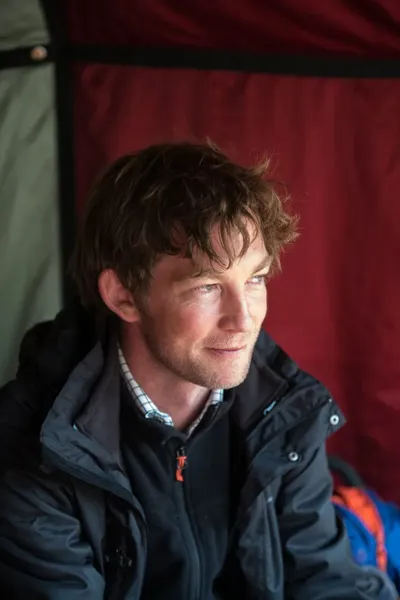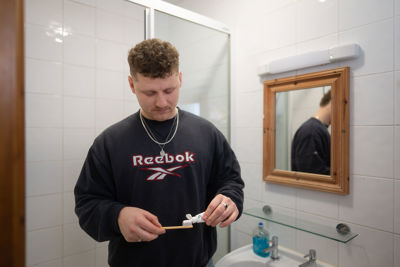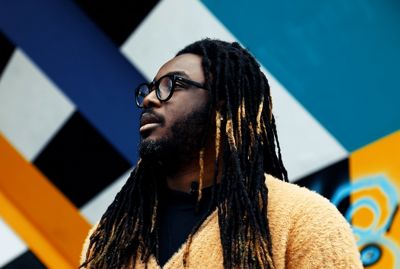"Mental health conditions are concepts, ideas of how to describe clusters of symptoms" - Our interview with Horatio Clare
10/04/2025
Horatio Clare is an author of travel, nature, and children's books and is the presenter on various BBC Radio shows. He also lives with cyclothymia and has experience of its highs and depressions, as well as being detained under the Mental Health Act.
Carl, from the Rethink website team, recently had the chance to chat to Horatio. They covered his thoughts on receiving a mental health diagnosis, three ways he would change the mental health system, and the power of writing on his recovery.
***
Hello, Horatio. Your latest book is called Your Journey Your Way and beautifully discusses your experiences of mental illness. How would you best sum up your mental health journey?
Learning! From first experiencing depression at university, and having no idea what it was, to now, having written three books and numerous radio programmes about it, the journey has been an extraordinary education.
Depression, mania and breakdown are horrendous experiences but you do learn such a lot about yourself, about the people you love, about life in this world and about the mind and body. If I had to sum the whole thing up, that’s it: learning.
What has your experience been of the mental health system?
Some of the kindest, most skilful and dedicated people I have ever met work in mental health. We are incredibly fortunate to have the care they give. And we have truly brilliant minds working to deliver treatments which will save many lives and spirits.
The problem is, what we know about mental health and what the system does about it are hopelessly divided. It does not just need more funds. It needs a ground-up rethink.
-
Every child in school needs to know that mental struggle is part of life, and not to be feared.
After you were detained in hospital, you wrote about the importance of Mental Health Act reform. If you were put in charge of the mental health system in this country, what three changes would you make first?
Firstly, every child in school needs to know that mental struggle is part of life, and not to be feared. We can help people through it; it’s not strange or inexplicable; and we can train young people to help each through it, too, by busting stigma and ignorance.
Secondly, I would put huge funding behind the recovery model: seeing a mental difficulty as the first stage on a journey to a wider, deeper, richer life, the kind of life your mind and soul need, rather than, as we do now, seeing it as a defect or damage, and the first step in long struggle. The struggle is real, but if you go about it in hope and expectation of recovery and growth, you are much more likely to recover and grow.
Thirdly, massively expand therapies like Open Dialogue and EMDR, and get everyone to a therapist as soon as they need it, rather than putting them on pills and waiting lists. (Though I am a great fan of medication when needed.)
-
Mental health conditions are not things in the world, like trees or tumours. They are concepts, ideas of how to describe clusters of symptoms.
You talk in your book about the pros and cons of getting a mental health diagnosis. Could you tell us more about your relationship with the concept of a diagnosis?
Diagnosis is great as long as you understand that you are getting a very general category for a very specific condition: You are not your diagnosis. You are not your symptoms. You are uniquely you, and so your diagnosis is likely – if you look it up online, for example – to be partly right and partly wrong.
So you have to work out which bits of it really apply to you, and which don’t. Remember, mental health conditions are not things in the world, like trees or tumours. They are concepts, ideas of how to describe clusters of symptoms. So they can be terrifically useful, and they do matter, but if they hold you back, dump them. It is vital that you insist on your diagnosis and treatment being as individual as possible.
There is only one test of a diagnosis – does it help? Does it help with how you feel, with your treatment and your recovery? If not, dump it. And watch out for antique and crushing language. ‘Personality disorders’ are being replaced with ‘complex emotional needs’ – it’s only language, but my God, what a huge difference.
-
Help is there, and we must fight for more of us to get it.
What role has writing played in your recovery?
Writing drives me to ask questions, look hard and listen. So it has made all the difference. A lot of the writing that matters to me will not be published – my winter diaries, which I rely on each year. They have given me at least as much help and joy and insight as the books and articles.
And anyone can do a diary – even if you hate writing you can record yourself and your thoughts. Getting them out, arranging them, holding them up so that you can hear them: this can be as powerful as magic, in healing.
We share real stories of lived experience to provide both hope to people living with mental illness and to tackle stigmatising attitudes still out there. What in your story do you think can provide hope and education?
I have learned (and lived the proof) that most mental suffering is a completely normal, reasonable and sensitive response to the delicate business of life. Most of don’t get the really expert help – in therapy and precise, personalised psychiatry – that is out there, that does get people better.
But the help is there, and we must fight for more of us to get it. And recovery is very real, and very common. The self-work it takes can be hard, but it does work. The CHIME framework – Connectedness, Hope, Identity, Meaning and Empowerment is a great place to start. Recovery is the next big adventure in mental health. It is a truly extraordinary field to be working and writing in.




